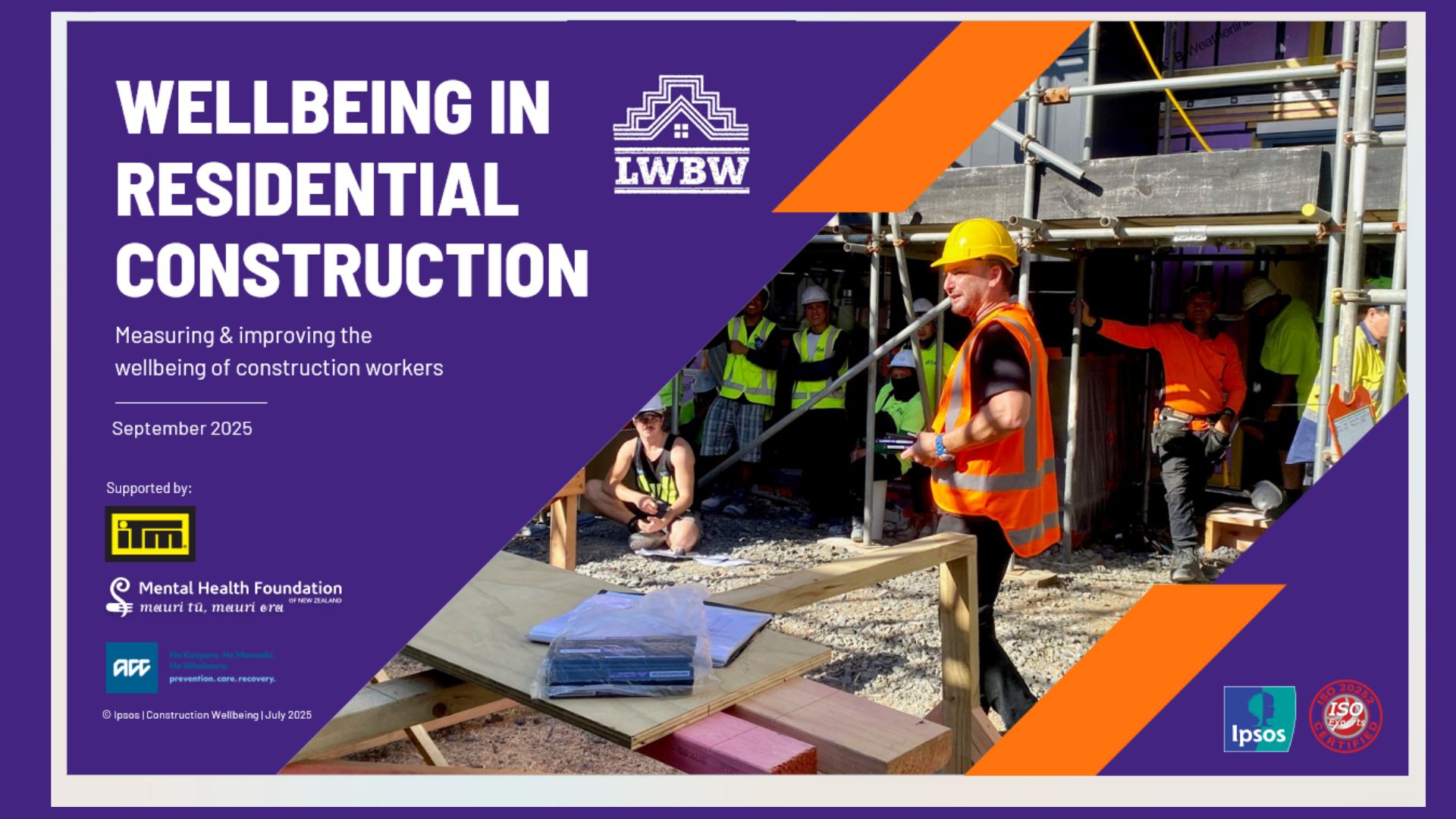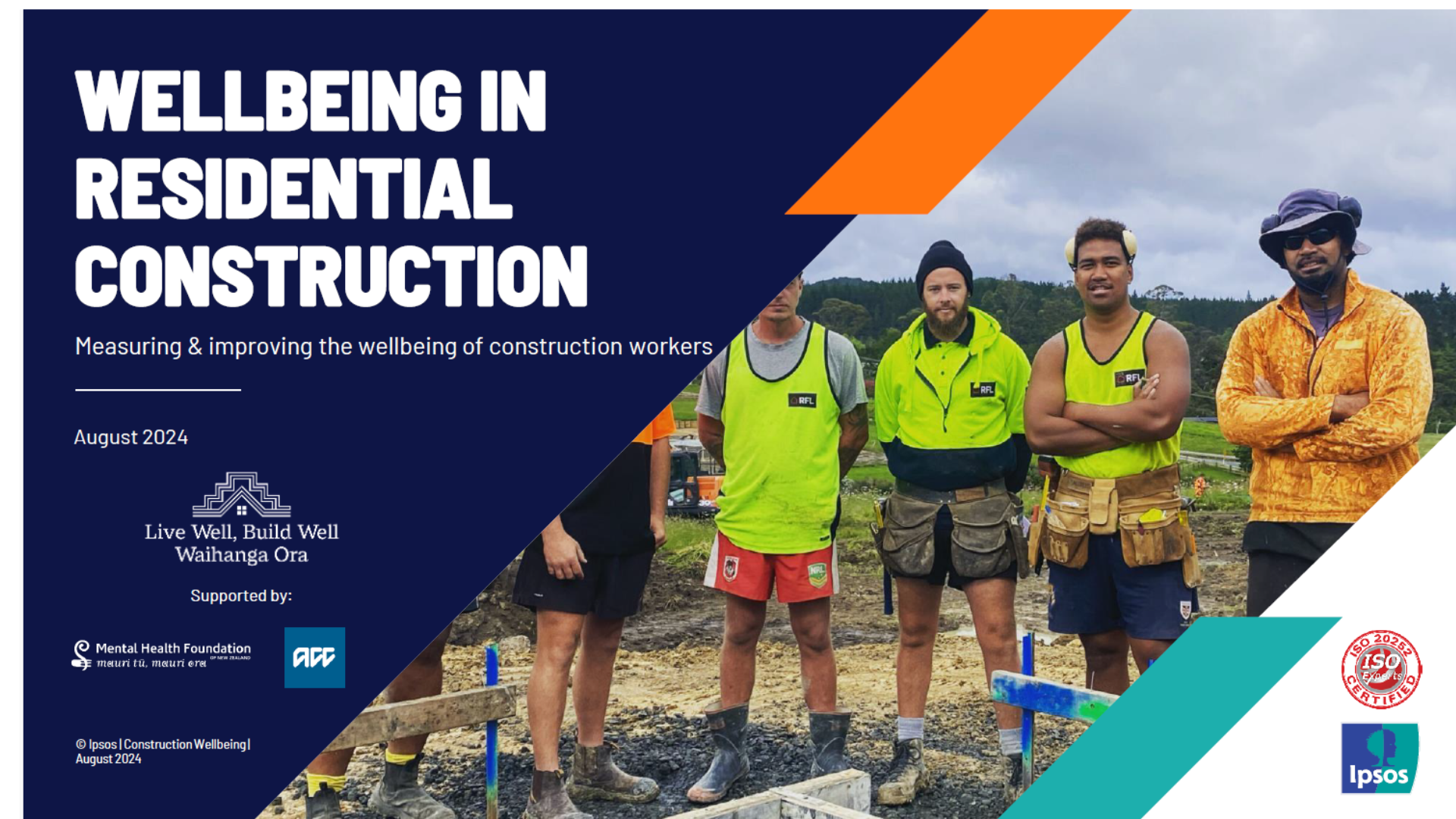Wellbeing in Residential Construction Research
Mental Fitness Surveys
Participating in wellbeing surveys as a builder or tradie is a good step toward creating a healthier and more supportive workplace environment. The data collected from these surveys helps us understand the levels of mental wellbeing and psychological resilience in the industry.
By sharing your experiences anonymously, you contribute to data that:
- identifies year-to-year trends
- helps us understand what is important to builders and tradies
- informs builders and tradies on how they are doing as an industry
2025 Live Well Build Well Survey Key Findings
Wellbeing
Builders and tradies are holding up well despite a major downturn in the building industry over that last 18 months.
Wellbeing scores for workers are similar to last year and remain slightly below the overall New Zealand adult average.
Compared with last year, builders and tradies are doing less activities that might increase their wellbeing.
This suggests more encouragement is needed for builders and tradies, by people they trust, to make the extra effort to plan simple wellbeing actions throughout their day. The most popular wellbeing activities for builders and tradies are connecting socially, exercise, having a good diet, relaxation, helping others and keeping organised.
For most builders and tradies stress has reduced slightly over the last year, and significantly over the last three years. 25% report being rarely stressed, and 52% sometimes stressed. However, 25% still say they are stressed always, or most of the time.
Work
Overall job satisfaction remains similar to last year, but work life balance has increased. However over 25% of builders and tradies still struggle to find the work life balance they want.
Reflecting the nation-wide instability in the sector, 15% expressed that inconsistent or insufficient hours were a key challenge in their jobs, compared to 8% in 2024.
Engagement with Live Well Build Well
Awareness of Live Well Build Well, through social media, industry organisations and word of mouth, increased from 18% in 2024 to 22% in 2025.
For those who are engaged with Live Well Build Well, using program resources has increased significantly over the last year — including listening to tradies sharing their mental health stories (from 32% to 38%) and tips on improving mental fitness (from 20% to 28%). Those reporting that the programme aided their emotional health doubled from 3% to 6%.
The Survey
The 2025 survey has a representative sample of 641 builders and tradies, from an estimated 165,000 builders and tradies.
The survey was made possible with the support of our Foundation Partner ITM
Key Insights from 2025 Survey
Full report 2025 Residential Construction Wellbeing Annual Survey
2024 Live Well Build Well Survey Key Findings
Wellbeing
Compared to 2023, residential construction workers reported being less stressed and lonely.
There are fewer workers reporting poor emotional wellbeing.
There has also been a decrease in the proportion of workers who state that they experienced stress all / most of the time at work in the last year.
Residential construction workers also appear to be taking more action to maintain or improve their wellbeing.
There remains a strong correlation between higher participation in wellbeing activities and feeling mentally well.
Despite these mental wellbeing improvements, the wellbeing of those working in the sector remains slightly below that of New Zealanders overall.
Work
The majority of residential construction workers stated that they are highly satisfied with their job. However, there has been an increase in workers’ reporting that they are dissatisfied with their work–life balance.
94% indicated that having a good work–life balance is important to them, only two thirds are satisfied with this aspect of their current job.
The relationship with their team / colleagues was most frequently reported as the most positive aspect of residential construction work. Talking to workmates about things other than work continues to be the top action taken by workers to maintain or improve their wellbeing.
After two years of Live Well, Build Well approximately 1 in 3 residential construction workers have at least heard of it, with 18% stating that they know at least a little bit about the programme.
Those who state that Live Well, Build Well has helped them most frequently reported that it has provided them with the tools / methods to help themselves deal with stress.
2023 Live Well Build Well Survey Key Findings
The residential construction sector’s life satisfaction and emotional wellbeing is comparable to New Zealanders overall.
Participation in wellbeing activities is high.
There is a strong correlation between higher participation in wellbeing activities and feeling well.
Pay, the nature of construction work, and workload are the key challenges facing those who work in the sector.
The sector is perceived to be more stressed by those who work in it than their own results indicate.
There is a strong correlation between positive actions around work and higher job satisfaction and lower levels of work-related stress.
Formalised wellbeing programmes are relatively rare, but most know how to seek help and feel supported with their wellbeing at work.
Full report 2023 Residential Construction Wellbeing Annual Survey
This research is our first annual survey using a nationally representative sample of residential construction workers. The results show a reasonable level of awareness of mental wellbeing and how to maintain good everyday mental health. This provides a positive basis on which to further support the industry in increasing the wellbeing of workers and related gains in work satisfaction, health, and injury reduction.
Foundational Research Report
One off qualitative foundational research 2022. This research was done at the start of the Live Well Build Well Programme. It gave an in depth understanding of what is important to builders and tradies when it comes to their wellbeing.





